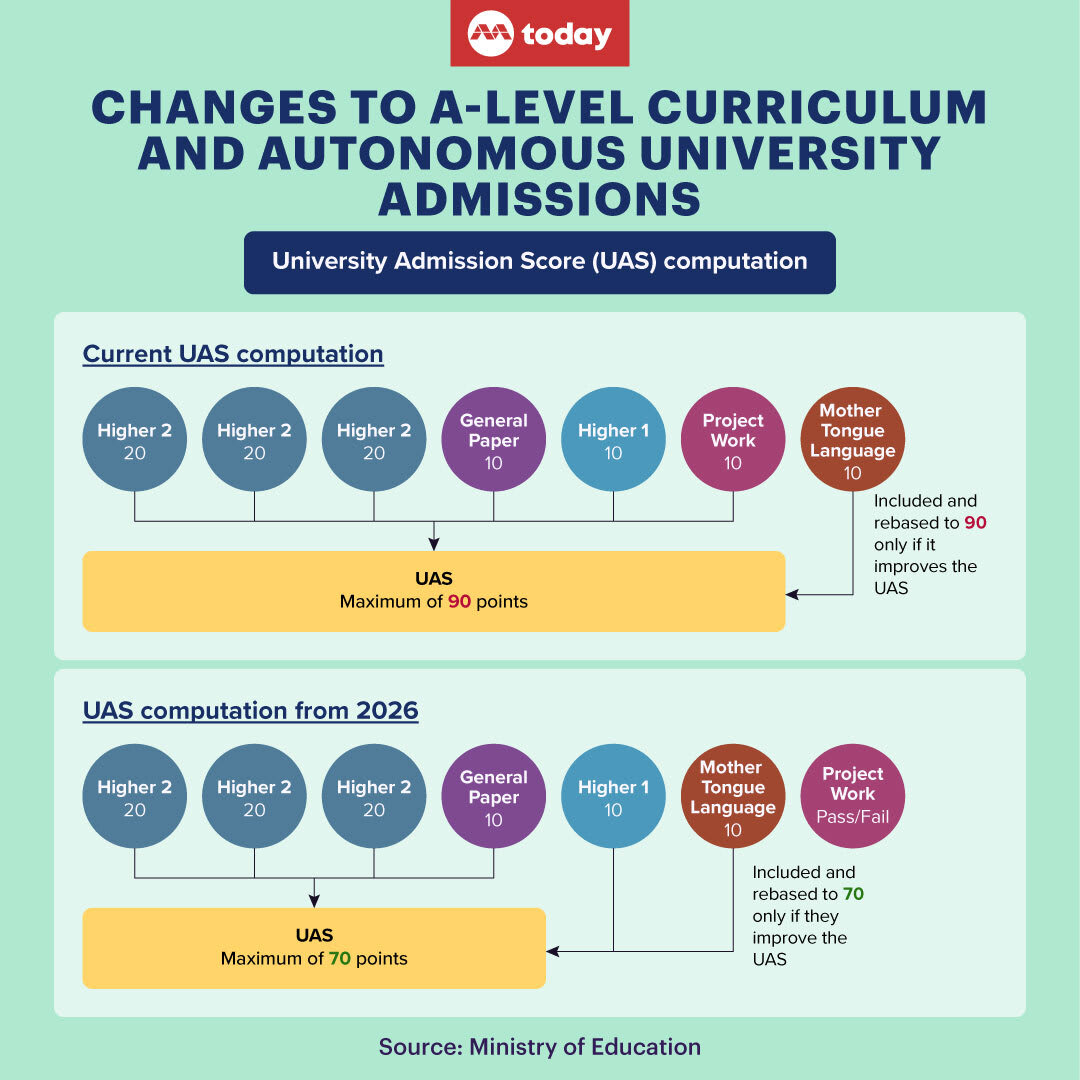A-Level scoring to change from 2026 to reduce emphasis on grades, give students room to pursue passions
SINGAPORE — The Ministry of Education (MOE) will be changing how GCE A-Level scores are calculated to give students here more room for exploring various areas of interests without being overly concerned about examination grades.

- Starting 2026, MOE will be changing how GCE A-Level scores are calculated
- Under the new system, the fourth content-based subject will be counted for university admissions only if it improves a candidate’s score
- The Project Work subject will also be changed to a pass or fail grading system from 2024
- These changes aim to provide more time and space for students to pursue their interests, MOE said
SINGAPORE — The way that GCE A-Level scores are calculated will be changed, to give students here more room for exploring various areas of interests without being overly concerned about examination grades, Minister for Education Chan Chun Sing said on Wednesday (March 1).
Under the new system that starts in 2026, the fourth content-based subject will only be counted for university admissions if it improves a candidate’s score, Mr Chan said during a debate on budget for the Ministry of Education (MOE).
These changes will apply to students who will be in the first year of junior college or Year 2 of Millennia Institute next year.
The Project Work subject will also be changed to a pass or fail grading system from 2024.
These changes aim to “rebalance” the overall A-Level curriculum load, lower the assessment stakes, as well as provide more time and space for students to pursue their interests, he said.
"To nurture the joy of learning, we want our students to follow their passions instead of only picking subjects that they will score well in," he added. "This will also allow our students to better calibrate their learning load so that more time can be redirected to holistic development."
WHY IT MATTERS
These moves are in line with the need to prepare students for a future where critical and inventive thinking is a more important skill.
In recent years, Mr Chan has spoken about the need for society to adopt a broader definition of success to relieve some of the stress that students feel from being put through Singapore’s education system.
By making such changes to how A-Level scores are calculated, students will be encouraged to take up subjects they are interested in but may not have that much confidence in pursuing.
This gives them room to explore other interests, instead of picking "safer" subjects they know they can score well but may not necessarily enjoy.
By lowering the stakes of some subjects, the aim is also to lessen the overall load on students, giving them more breathing room to pursue other interests outside the classroom, such as leadership opportunities, volunteer work or co-curricular activities.
NEW SCORING SYSTEM
Currently, junior college and Millennia Institute students applying to enter autonomous universities are required to include the following subjects in the computation of their University Admission Score.
- General Paper: Involves essay writing, comprehension and knowledge of current affairs in English
- Project Work: Requires students to work together in a group to complete a project
- Four content-based subjects based on students’ choice
For content-based subjects, students may choose to take four Higher 2 (H2) ones or three H2 and one Higher 1 (H1) subjects. Students who opt for H2 subjects study more in-depth content.
For students who take four H2 subjects, their lowest-scoring subject in the A-Level examinations is considered as an H1 subject for the purpose of computing the score.
Under the new system, the fourth content-based subject will only be included if it improves a student’s University Admission Score.
Project Work will also be removed from the computation, with students receiving either a pass or fail grade. Students will need to pass Project Work for university applications.
“Making Project Work a pass-or-fail subject lowers assessment stakes, and encourage students to develop creativity in areas of interests, rather than be driven by grades," Mr Chan said.
MOE said in a statement that the Project Work curriculum will “remain rigorous to ensure students are able to develop the relevant skills and competencies”.
With these changes, the maximum University Admission Score will become 70 points in 2026 instead of 90 now.

REMOVAL OF MID-YEAR EXAMINATIONS
In a continuation of school-based assessment changes rolled out in primary and secondary schools, mid-year examinations will be progressively removed for consecutive cohorts of junior college and Millennia Institute students from 2024.
This is part of a shift away from an over-emphasis on testing and academic results, MOE said in its statement.
In his speech in Parliament, Mr Chan said: "The time saved from preparing for examinations can be channelled towards deeper student engagement and learning through more varied experiences."
MOE added that the removal of mid-year examinations will not be replaced by more school-based assessments and schools must not administer more than one weighted assessment for each subject a term.
Scores from weighted assessments count towards a student's overall result in a subject for the year.
From 2024, all junior college and Millennia Institute students are must also take General Paper as a compulsory subject.
Knowledge and Inquiry, which focuses on the nature and construction of knowledge, will no longer be offered in lieu of General Paper, but will continue to be offered to students.
OTHER ANNOUNCEMENTS BY MOE
FULL SUBJECT-BASED BANDING
- Starting from the 2024 Secondary 1 cohort, full subject-based banding will be implemented in 120 secondary schools
- The Ministry of Education (MOE) will post students to secondary schools through three posting groups, which are assigned based on Primary School Leaving Examination (PSLE) scores
- These posting groups will only be used to facilitate admissions and to determine students' initial subject levels for most subjects at the beginning of Secondary 1. Beyond that, posting groups will not shape the secondary school experience.
- Students will end up in mixed form classes comprising students from different posting groups
- Schools will thus enable diversity at the class level, with mixed form classes that comprise students offering subjects at different subject levels.
- Under this banding, students will have greater flexibility to customise their learning suited to their strengths, interests and learning needs, MOE said
- Schools offering the Integrated Programme and specialised schools will not implement the full features of full subject-based banding because they cater to specific student profiles through a whole-school approach, Mr Chan said
INCREASE IN 'LIFETIME COHORT PARTICIPATION RATE'
- MOE will increase the “Lifetime Cohort Participation Rate” for publicly funded university degrees from 50 per cent to 60 per cent by 2025 for fresh school leavers and adult learners
- This means up to 2,300 more publicly funded university places in 2025 from 2022
- It will also be weighted towards enabling adult learners from the workforce to access a university upgrading pathway
- With this increase in subsidised university places, more individuals will be able to pursue a degree or upgrade their skills later in life
POLYTECHNIC FOUNDATION PROGRAMME
- The one-year programme offers eligible Normal (Academic) students a practice-based preparatory pathway to a polytechnic education
- As announced in 2022, MOE will relax two "B" subject grades to G2 Grade 4 or G3 E8 for admissions to the programme from the academic year 2024
- From 2028, MOE will allow students taking G3 subjects, or a mix of G2 and G3 subjects, to access the programme by mapping their G3 grade to the G2 equivalent
- Following this change, up to 2,600 students a year are expected to be eligible from 2028, up from about 1,700 students a year today











